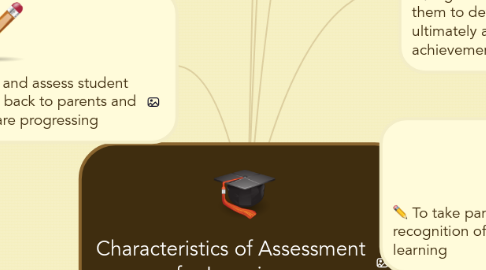
1. For the teacher to monitor and assess student achievement and to report back to parents and other staff as to how they are progressing
2. For teachers to plan lessons and tasks that should set out clear objectives so that progress can be measured
3. To make the lesson objectives clear to the staff and students as to what is expected of them and the learning outcome
4. It informs and promotes the achievement of all students by encouraging them to take responsibility for their own learning
5. Student Centered Learning
5.1. RESOURCES
5.1.1. Files
5.1.1.1. SCC-Brief
5.1.1.2. SCC-Literature
5.1.1.3. Innovation Config. Map
5.1.1.4. UCILT Note Template
5.1.1.5. ICC Start Sheet
5.1.1.6. CEI Sub-Committee
5.1.1.7. Sample Desired State
5.1.1.8. PLC Cap Mat
5.1.1.9. IQC Seen in Classrooms
5.1.2. Links
5.1.2.1. AEA Iowa Core
5.1.2.2. Moodle Constructionism
5.1.2.3. SCC Booklet
5.1.2.4. Darling-Hammond
5.2. Metacognition
5.2.1. RESOURCES
5.2.1.1. Darling-Hammond
5.2.1.2. ICC Metacognition Rubric
5.2.1.3. Metacognition Power Point
5.2.1.4. Metacognition Research
5.2.1.5. Metacognitive Teachers
5.2.1.6. Self-Monitoring Students
5.2.1.7. Self-Regulated Students
5.2.1.8. Thinking Critically
5.2.1.9. Stephen Heppell
5.2.2. Reflection
5.2.2.1. Metacogntion Madness (activity)
5.2.2.2. M&M student work
5.2.3. Self-Regulation
5.2.3.1. Capacity Matrix Tutorial
5.2.3.2. Capacity Matrix Resources
5.3. Construction of Learning
5.3.1. RESOURCES
5.3.2. Tricks & Treats
5.3.3. Spider Diagrams
5.3.3.1. High School
5.3.3.2. Middle School
5.3.3.3. Jensen & Rolling Green
5.3.3.4. Karen Acres & Valerius
5.3.4. SCI for Content Areas
5.3.4.1. Art
5.3.4.2. Literacy
5.3.4.3. Math
5.3.4.4. Media Center
5.3.4.5. Middle School
5.3.4.6. Music
5.3.4.7. Science
5.4. Educational-Learner Partnership
5.4.1. RESOURCES
5.5. Collaborative Learning
5.5.1. Resource Links
5.5.2. Building Dynamic Groups
5.5.3. What is Collaborative Learning?
5.5.4. Collaborative Learning Booklet
5.5.5. 44 Benefits of Collaborative Learning
5.5.6. Social Skills and Community Building
5.6. Authentic Assessment
5.6.1. RESOURCE LINKS
5.6.2. 5 Fives
5.6.3. 10 Tips
5.6.4. School of the Future
6. It gives feedback on student progress and enables them to develop self assessment skills so they are ultimately able to reflect on and recognise own achievements
7. To take part in peer assessment to build a recognition of what is needed to improve own learning
8. Assessment for Learning
8.1. Foundations
8.1.1. RESEARCH ARTICLES
8.1.2. Inside the Black Box
8.1.3. Advancing Formative Assessment
8.1.4. What a difference a WORD makes
8.1.5. The Benefits of Formative Assessment
8.1.6. Assessment Manifesto
